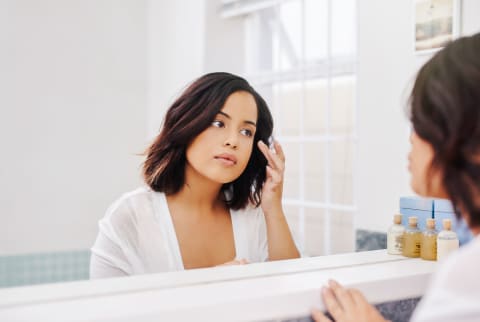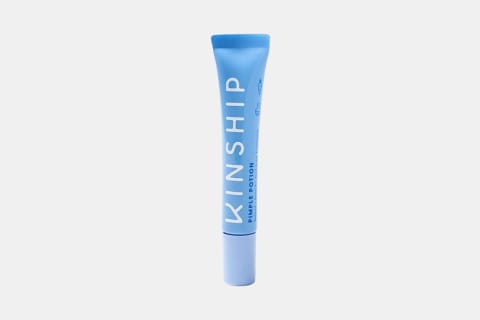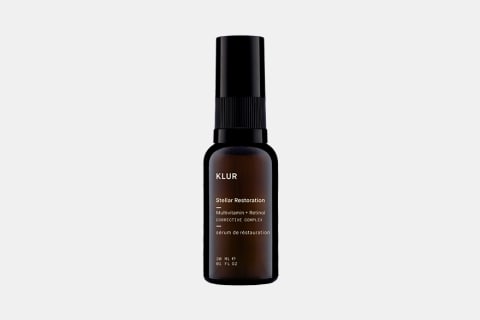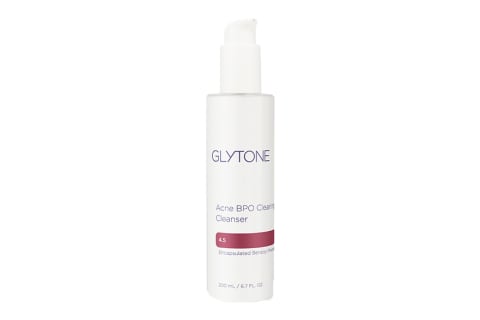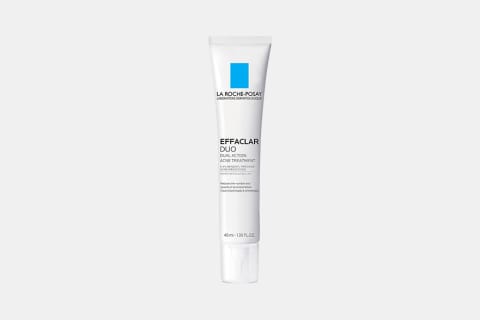Advertisement
Benzoyl Peroxide vs. Salicylic Acid: What's The Difference & Which Should You Use?

Becoming well-versed in the glossary of acne-fighting ingredients, we admit, is no walk in the park (the acids alone can be dizzying). But when those pesky blemishes pop up, you don't want to slather on any ol' ingredient and hope for the best—you need to make an informed choice based on your skin type.
There's no shortage of treatments to choose from, but let's start with two of the most popular: benzoyl peroxide and salicylic acid. They're often touted as the best solutions for managing acne, but it's important to know just when and how to use both of these powerful ingredients (hint: It depends on the type of acne you have).
What is benzoyl peroxide?
Like its cousin, hydrogen peroxide, benzoyl peroxide is antimicrobial—meaning it can kill bacteria. But while you should definitely steer clear of using hydrogen peroxide for acne (short answer: It's way too harsh for your skin), there's tons of research1 touting the latter as an effective acne treatment because of these antimicrobial properties.
Why? Acne is a very complex chronic skin disease, with multiple factors at play in its formation. And one of those factors is a bacteria called P. acnes. P. acnes is actually the most abundant bacteria2 on the skin (it gets widely demonized, but it actually does a lot of good for us, including keeping our skin looking youthful). When the balance of P. acnes is off, and certain strains become too dominate, it can lead to breakouts. This is why aiming to keep a balance of your skin microbiome is so important for overall skin health.
So for those experiencing serious cases of acne, targeting bacteria can be an effective tool to reduce the lesions and reduce the chances of new ones forming. It's certainly not a permanent solution (it only works as long as you're using it, and you'll likely not want to use it long term as it's very drying), but it can definitely help folks to address moderate acne when needed.
It's available in both prescription form (read: you must visit a dermatologist) or OTC (so you can buy it your drugstore).
- Pros: "It kills the bacteria, P. acnes, that lives within our hair follicles, and it also helps to break up and remove dead skin cells that clog our pores," explains board-certified dermatologist Ife J. Rodney, M.D., FAAD, founding director of Eternal Dermatology + Aesthetics. That means the acid can be helpful for both inflammatory acne (your angry pustules, cysts, and pimples) as well as comedonal acne (blackheads and whiteheads).
- Cons: However, some might find benzoyl peroxide to be rather drying. "Skin dryness and irritation are the most common side effects," Rodney mentions. Especially for those with sensitive skin, you might face some burning, redness, stinging, and skin peeling. It makes sense: Peroxide has the ability to bleach fabrics, so it's understandable the ingredient might be too harsh for some sensitive-skinned folk.
What is benzoyl peroxide?
What is salicylic acid?
Salicylic acid comes from the beta-hydroxy acid (BHA) family. In case you need a refresher on those lovely BHAs, these acids are oil-soluble, meaning they can penetrate deep into your pores and unclog them at the source. Salicylic acid is a popular choice, as it can gently dissolve dead skin cells by breaking apart the bonds that hold them together, promoting cell turnover and smooth, bright skin underneath. It also works to dry out sebum in the skin, which can contribute to acne. So while benzoyl peroxide works by targeting the bacteria, this works by eliminating the oil and sebum.
- Pros: BHAs like salicylic acid are great for reducing blackheads, whiteheads, and milia (aka comedonal acne). Plus, they typically do so in a nonirritating way: "BHAs also have anti-inflammatory, skin-calming properties, so they are gentle enough even for sensitive skin prone to redness and/or rosacea," notes board-certified dermatologist Hadley King, M.D. Another added benefit? Rodney mentions salicylic acid can help prevent post-inflammatory hyperpigmentation, especially for those with darker skin tones.
- Cons: While salicylic acid is great for unclogging pores, it won't necessarily help with deep, severe pustules.
What is salicylic acid?
How to decide which you should use.
Let us emphasize: Every product is different, so there aren't too many hard-and-fast rules. For example, benzoyl peroxide products (which tend to be more drying) might come buffered with hydrating actives to simultaneously lock in moisture while shrinking pimples in size. Similarly, salicylic acid might be paired with AHAs in combination treatments to further resurface the skin, which can actually cause irritation for some. See the nuance here?
But generally, here's how to decide when to use both:
- Identify what type of acne you have: Time to I.D. your acne in the mirror. Are your bumps painful or underneath the skin? Or do they come to a head on the surface? For those angry pustules, you might want to reach for a benzoyl peroxide spot treatment (if you can tolerate it, of course). For blackheads and whiteheads, salicylic acid can unclog those pores. While benzoyl peroxide technically can help with comedonal acne, it's mainly hailed for shrinking inflammatory pimples.
- Check your other skin care products: Before diving straight into either treatment, you'll want to check your skin care lineup to make sure there aren't any ingredients that can irritate your skin or cancel out. For example: "When benzoyl peroxide and retinoids (or retinols) are used at the same time, they may interact and make them both less effective," Rodney mentions. If you do use retinol, she recommends sticking to a benzoyl peroxide face wash in the morning, so you can apply retinol at night, and the two won't interact. Win-win.
- Mind your skin type: "While both of these ingredients have the potential to dry out and irritate the skin, I find that there are more people who experience redness and irritation from benzoyl peroxide," says King. Of course, every person is different—your skin might be totally fine with benzoyl peroxide, especially if the product also contains calming ingredients. But as a general rule, those with sensitive skin might fare better with a gentler salicylic acid treatment, especially if you're also prone to oiliness and clogged pores.
FAQ
Can you use benzoyl peroxide and salicylic acid at the same time?
Both benzoyl peroxide and salicylic acid can be solutions for acne, but they use very different mechanisms. Benzoyl peroxide targets the bacteria, and salicylic acid addresses the sebum. They can be used at the same time, however that'd likely be very irritating for most folks. We recommend consulting with a skin care professional before using them simultaneously.
Which is more effective: benzoyl peroxide or salicylic acid?
Benzoyl peroxide and salicylic acid are both effective acne-targeting ingredients. Benzoyl peroxide is likely more effective at treating pustules and deeper pimples, while salicylic acid is great for whiteheads, blackheads, and post-inflammatory hyperpigmentation.
Is benzoyl peroxide or salicylic acid better for acne scars?
As an exfoliator salicylic acid is better for treating acne scars. However severe acne scars (such as ice pick scars) usually require professional intervention.
The takeaway.
Both benzoyl peroxide and salicylic acid are solid acne-fighting ingredients—it just depends on the type of acne you have. Your skin type also matters when choosing a treatment, as do the other skin care products in your routine, but the general verdict is this: For inflamed zits, an antibacterial benzoyl peroxide product is best (seek options buffered with hydrating actives to combat the drying effects); for pesky blackheads and whiteheads, oil-soluble salicylic acid is your guy. Want another modality to help you on your acne journey? Read our explainer on acne facials.
